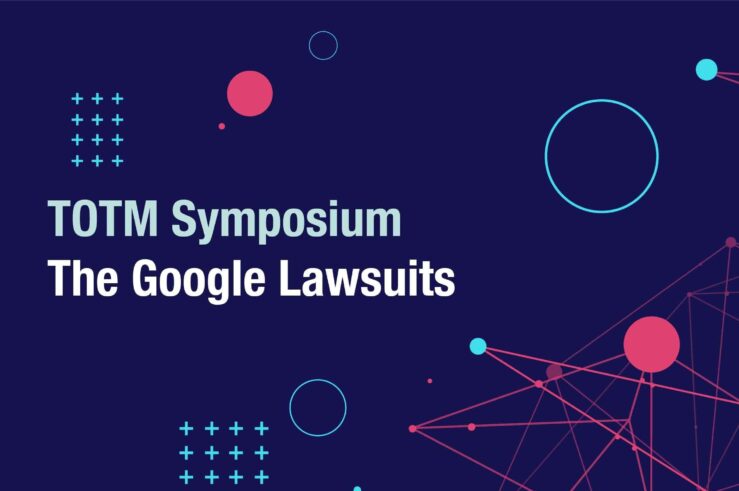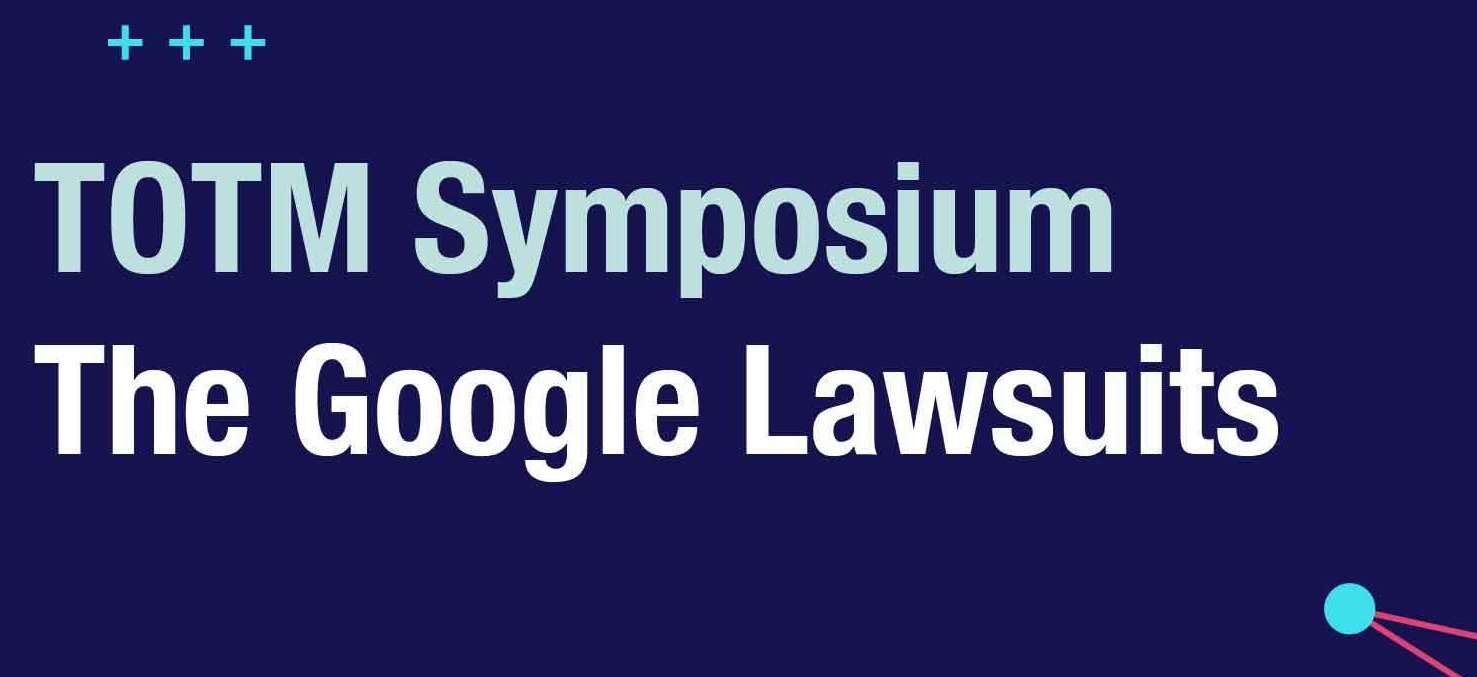
This article is a part of the Symposium on the Future of American Antitrust: The Google Lawsuits symposium.

It is my endeavor to scrutinize the questionable assessment articulated against default settings in the U.S. Justice Department’s lawsuit against Google. Default, I will argue, is no antitrust fault. Default in the Google case drastically differs from default referred to in the Microsoft case. In Part I, I argue the comparison is odious. Furthermore, in Part II, it will be argued that the implicit prohibition of default settings echoes, as per listings, the explicit prohibition of self-preferencing in search results. Both aspects – default’s implicit prohibition and self-preferencing’s explicit prohibition – are the two legs of a novel and integrated theory of sanctioning corporate favoritism. The coming to the fore of such theory goes against the very essence of the capitalist grain. In Part III, I note the attempt to instill some corporate selflessness is at odds with competition on the merits and the spirit of fundamental economic freedoms.
When Default is No-Fault
The recent complaint filed by the DOJ and 11 state attorneys general claims that Google has abused its dominant position on the search-engine market through several ways, notably making Google the default search engine both in Google Chrome web browser for Android OS and in Apple’s Safari web browser for iOS. Undoubtedly, default setting confers a noticeable advantage for users’ attraction – it is sought and enforced on purpose. Nevertheless, the default setting confers an unassailable position unless the product remains competitive. Furthermore, the default setting can hardly be proven to be anticompetitive in the Google case. Indeed, the DOJ puts considerable effort in the complaint to make the Google case resemble the 20-year-old Microsoft case. Former Federal Trade Commission Chairman William Kovacic commented: “I suppose the Justice Department is telling the court, ‘You do not have to be scared of this case. You’ve done it before […] This is Microsoft part 2.”[1]
However, irrespective of the merits of the Microsoft case two decades ago, the Google default setting case bears minimal resemblance to the Microsoft default setting of Internet Explorer. First, as opposed to the Microsoft case, where default by Microsoft meant pre-installed software (i.e., Internet Explorer)[2], the Google case does not relate to the pre-installment of the Google search engine (since it is just a webpage) but a simple setting. This technical difference is significant: although “sticky”[3], the default setting, can be outwitted with just one click[4]. It is dissimilar to the default setting, which can only be circumvented by uninstalling software[5], searching and installing a new one[6]. Moreover, with no certainty that consumers will effectively use Google search engine, default settings come with advertising revenue sharing agreements between Google and device manufacturers, mobile phone carriers, competing browsers and Apple[7]. These mutually beneficial deals represent a significant cost with no technical exclusivity [8]. In other words, the antitrust treatment of a tie-in between software and hardware in the Microsoft case cannot be convincingly extrapolated to the default setting of a “webware”[9] as relevant in the Google case.
Second, the Google case cannot legitimately resort to extrapolating the Microsoft case for another technical (and commercial) aspect: the Microsoft case was a classic tie-in case where the tied product (Internet Explorer) was tied into the main product (Windows). As a traditional tie-in scenario, the tied product (Internet Explorer) was “consistently offered, promoted, and distributed […] as a stand-alone product separate from, and not as a component of, Windows […]”[10]. In contrast, Google has never sold Google Chrome or Android OS. It offered both Google Chrome and Android OS for free, necessarily conditional to Google search engine as default setting. The very fact that Google Chrome or Android OS have never been “stand-alone” products, to use the Microsoft case’s language, together with the absence of software installation, dramatically differentiates the features pertaining to the Google case from those of the Microsoft case. The Google case is not a traditional tie-in case: it is a case against default setting when both products (the primary and related products) are given for free, are not saleable, are neither tangible nor intangible goods but only popular digital services due to significant innovativeness and ease of usage. The Microsoft “complaint challenge[d] only Microsoft’s concerted attempts to maintain its monopoly in operating systems and to achieve dominance in other markets, not by innovation and other competition on the merits, but by tie-ins.” Quite noticeably, the Google case does not mention tie-in ,as per Google Chrome or Android OS.
The complaint only refers to tie-ins concerning Google’s app being pre-installed on Android OS. Therefore, concerning Google’s dominance on the search engine market, it cannot be said that the default setting of Google search in Android OS entails tie-in. Google search engine has no distribution channel (since it is only a website) other than through downstream partnerships (i.e., vertical deals with Android device manufacturers). To sanction default setting on downstream trading partners is tantamount to refusing legitimate means to secure distribution channels of proprietary and zero-priced services. To further this detrimental logic, it would mean that Apple may no longer offer its own apps in its own iPhones or, in offline markets, that a retailer may no longer offer its own (default) bags at the till since it excludes rivals’ sale bags. Products and services naked of any adjacent products and markets (i.e., an iPhone or Android OS with no app or a shopkeeper with no bundled services) would dramatically increase consumers’ search costs while destroying innovators’ essential distribution channels for innovative business models and providing few departures from the status quo as long as consumers will continue to value default products[11].
Default should not be an antitrust fault: the Google case makes default settings a new line of antitrust injury absent tie-ins. In conclusion, as a free webware, Google search’s default setting cannot be compared to default installation in the Microsoft case since minimal consumer stickiness entails (almost) no switching costs. As free software, Google’s default apps cannot be compared to Microsoft case either since pre-installation is the sine qua non condition of the highly valued services (Android OS) voluntarily chosen by device manufacturers. Default settings on downstream products can only be reasonably considered as antitrust injury when the dominant company is erroneously treated as a de facto essential facility – something evidenced by the similar prohibition of self-preferencing.
When Self-Preference is No Defense
Self-preferencing is to listings what the default setting is to operating systems. They both are ways to market one’s own products (i.e., alternative to marketing toward end-consumers). While default setting may come with both free products and financial payments (Android OS and advertising revenue sharing), self-preferencing may come with foregone advertising revenues in order to promote one’s own products. Both sides can be apprehended as the two sides of the same coin:[12] generating the ad-funded main product’s distribution channels – Google’s search engine. Both are complex advertising channels since both venues favor one’s own products regarding consumers’ attention. Absent both channels, the payments made for default agreements and the foregone advertising revenues in self-preferencing one’s own products would morph into marketing and advertising expenses of Google search engine toward end-consumers.
The DOJ complaint lambasts that “Google’s monopoly in general search services also has given the company extraordinary power as the gateway to the internet, which uses to promote its own web content and increase its profits.” This blame was at the core of the European Commission’s Google Shopping decision in 2017[13]: it essentially holds Google accountable for having, because of its ad-funded business model, promoted its own advertising products and demoted organic links in search results. According to which Google’s search results are no longer relevant and listed on the sole motivation of advertising revenue
But this argument is circular: should these search results become irrelevant, Google’s core business would become less attractive, thereby generating less advertising revenue. This self-inflicted inefficiency would deprive Google of valuable advertising streams and incentivize end-consumers to switch to search engine rivals such as Bing, DuckDuckGo, Amazon (product search), etc. Therefore, an ad-funded company such as Google needs to reasonably arbitrage between advertising objectives and the efficiency of its core activities (here, zero-priced organic search services). To downplay (the ad-funded) self-referencing in order to foster (the zero-priced) organic search quality would disregard the two-sidedness of the Google platform: it would harm advertisers and the viability of the ad-funded business model without providing consumers and innovation protection it aims at providing. The problematic and undesirable concept of “search neutrality” would mean algorithmic micro-management for the sake of an “objective” listing considered acceptable only to the eyes of the regulator.
Furthermore, self-preferencing entails a sort of positive discrimination toward one’s own products[14]. If discrimination has traditionally been antitrust lines of injuries, self-preferencing is an “epithet”[15] outside antitrust remits for good reasons[16]. Indeed, should self-interested (i.e., rationally minded) companies and individuals are legally complied to self-demote their own products and services? If only big (how big?) companies are legally complied to self-demote their products and services, to what extent will exempted companies involved in self-preferencing become liable to do so?
Indeed, many uncertainties, legal and economic ones, may spawn from the emerging prohibition of self-preferencing. More fundamentally, antitrust liability may clash with basic corporate governance principles where self-interestedness allows self-preferencing and command such self-promotion. The limits of antitrust have been reached when two sets of legal regimes, both applicable to companies, suggest contradictory commercial conducts. To what extent may Amazon no longer promote its own series on Amazon Video in a similar manner Netflix does? To what extent can Microsoft no longer promote Bing’s search engine to compete with Google’s search engine effectively? To what extent Uber may no longer promote UberEATS in order to compete with delivery services effectively? Not only the business of business is doing business[17], but also it is its duty for which shareholders may hold managers to account.
The self is moral; there is a corporate morality of business self-interest. In other words, corporate selflessness runs counter to business ethics since corporate self-interest yields the self’s rivalrous positioning within a competitive order. Absent a corporate self-interest, self-sacrifice may generate value destruction for the sake of some unjustified and ungrounded claims. The emerging prohibition of self-preferencing, similar to the established ban on the default setting on one’s own products into other proprietary products, materializes the corporate self’s losing. Both directions coalesce to instill the legally embedded duty of self-sacrifice for the competitor’s welfare instead of the traditional consumer welfare and the dynamics of innovation, which never unleash absent appropriabilities. In conclusion, to expect firms, however big or small, to act irrespective of their identities (i.e., corporate selflessness) would constitute an antitrust error and would be at odds with capitalism.
Toward an Integrated Theory of Disintegrating Favoritism
The Google lawsuit primarily blames Google for default settings enforced via several deals. The lawsuit also makes self-preferencing anticompetitive conduct under antitrust rules. These two charges are novel and dubious in their remits. They nevertheless represent a fundamental catalyst for the development of a new and problematic unified antitrust theory prohibiting favoritism: companies may no longer favor their products and services, both vertically and horizontally, irrespective of consumer benefits, irrespective of superior efficiency arguments, and irrespective of dynamic capabilities enhancement. Indeed, via an unreasonably expanded vision of leveraging, antitrust enforcement is furtively banning a company to favor its own products and services based on greater consumer choice as a substitute to consumer welfare, based on the protection of the opportunities of rivals to innovate and compete as a substitute to the essence of competition and innovation, and based on limiting the outreach and size of companies as a substitute to the capabilities and efficiencies of these companies. Leveraging becomes suspicious and corporate self-favoritism under accusation. The Google lawsuit materializes this impractical trend, which further enshrines the precautionary approach to antitrust enforcement[18].
[1] Jessica Guynn, Google Justice Department antitrust lawsuit explained: this is what it means for you. USA Today, October 20, 2020.
[2] The software (Internet Explorer) was tied in the hardware (Windows PC).
[3] U.S. v Google LLC, Case A:20, October 20, 2020, 3 (referring to default settings as “especially sticky” with respect to consumers’ willingness to change).
[4] While the DOJ affirms that “being the preset default general search engine is particularly valuable because consumers rarely change the preset default”, it nevertheless provides no evidence of the breadth of such consumer stickiness. To be sure, search engine’s default status does not necessarily lead to usage as evidenced by the case of South Korea. In this country, despite Google’s preset default settings, the search engine Naver remains dominant in the national search market with over 70% of market shares. The rivalry exerted by Naver on Google demonstrates that limits of consumer stickiness to default settings. See Alesia Krush, Google vs. Naver: Why Can’t Google Dominate Search in Korea? Link-Assistant.Com, available at: https://www.link-assistant.com/blog/google-vs-naver-why-cant-google-dominate-search-in-korea/ . As dominant search engine in Korea, Naver is subject to antitrust investigations with similar leveraging practices as Google in other countries, see Shin Ji-hye, FTC sets up special to probe Naver, Google, The Korea Herald, November 19, 2019, available at : http://www.koreaherald.com/view.php?ud=20191119000798 ; Kim Byung-wook, Complaint against Google to be filed with FTC, The Investor, December 14, 2020, available at : https://www.theinvestor.co.kr/view.php?ud=20201123000984 (reporting a complaint by Naver and other Korean IT companies against Google’s 30% commission policy on Google Play Store’s apps).
[5] For instance, the then complaint acknowledged that “Microsoft designed Windows 98 so that removal of Internet Explorer by OEMs or end users is operationally more difficult than it was in Windows 95”, in U.S. v Microsoft Corp., Civil Action No 98-1232, May 18, 1998, para.20.
[6] The DOJ complaint itself quotes “one search competitor” who is reported to have noted consumer stickiness “despite the simplicity of changing a default setting to enable customer choice […]” (para.47). Therefore, default setting for search engine is remarkably simple to bypass but consumers do not often do so, either due to satisfaction with Google search engine and/or due to search and opportunity costs.
[7] See para.56 of the DOJ complaint.
[8] Competing browsers can always welcome rival search engines and competing search engine apps can always be downloaded despite revenue sharing agreements. See paras.78-87 of the DOJ complaint.
[9] Google search engine is nothing but a “webware” – a complex set of algorithms that work via online access of a webpage with no prior download. For a discussion on the definition of webware, see https://www.techopedia.com/definition/4933/webware .
[10] Id. para.21.
[11] Such outcome would frustrate traditional ways of offering computers and mobile devices as acknowledged by the DOJ itself in the Google complaint: “new computers and new mobile devices generally come with a number of preinstalled apps and out-of-the-box setting. […] Each of these search access points can and almost always does have a preset default general search engine”, at para. 41. Also, it appears that present default general search engine is common commercial practices since, as the DOJ complaint itself notes when discussing Google’s rivals (Microsoft’s Bing and Amazon’s Fire OS), “Amazon preinstalled its own proprietary apps and agreed to make Microsoft’s Bing the preset default general search engine”, in para.130. The complaint fails to identify alternative search engines which are not preset defaults, thus implicitly recognizing this practice as a widespread practice.
[12] To use Vesterdof’s language, see Bo Vesterdorf, Theories of Self-Preferencing and Duty to Deal – Two Sides of the Same Coin, Competition Law & Policy Debate 1(1) 4, (2015). See also Nicolas Petit, Theories of Self-Preferencing under Article 102 TFEU: A Reply to Bo Vesterdorf, 5-7 (2015).
[13] Case 39740 Google Search (Shopping). Here the foreclosure effects of self-preferencing are only speculated: « the Commission is not required to prove that the Conduct has the actual effect of decreasing traffic to competing comparison shopping services and increasing traffic to Google’s comparison-shopping service. Rather, it is sufficient for the Commission to demonstrate that the Conduct is capable of having, or likely to have, such effects.” (para.601 of the Decision). See P. Ibáñez Colomo, Indispensability and Abuse of Dominance: From Commercial Solvents to Slovak Telekom and Google Shopping, 10 Journal of European Competition Law & Practice 532 (2019); Aurelien Portuese, When Demotion is Competition: Algorithmic Antitrust Illustrated, Concurrences, no 2, May 2018, 25-37; Aurelien Portuese, Fine is Only One Click Away, Symposium on the Google Shopping Decision, Case Note, 3 Competition and Regulatory Law Review, (2017).
[14] For a general discussion on law and economics of self-preferencing, see Michael A. Salinger, Self-Preferencing, Global Antitrust Institute Report, 329-368 (2020).
[15]Pablo Ibanez Colomo, Self-Preferencing: Yet Another Epithet in Need of Limiting Principles, 43 World Competition (2020) (concluding that self-preferencing is « misleading as a legal category »).
[16] See, for instances, Pedro Caro de Sousa, What Shall We Do About Self-Preferencing? Competition Policy International, June 2020.
[17] Milton Friedman, The Social Responsibility of Business is to Increase Its Profits, New York Times, September 13, 1970. This echoes Adam Smith’s famous statement that « It is not from the benevolence of the butcher, the brewer, or the baker, that we expect our dinner, but from their regard for their own self-interest » from the 1776 Wealth of Nations. In Ayn Rand’s philosophy, the only alternative to rational self-interest is to sacrifice one’s own interests either for fellowmen (altruism) or for supernatural forces (mysticism). See Ayn Rand, The Objectivist Ethics, in The Virtue of Selfishness, Signet, (1964).
[18] Aurelien Portuese, European Competition Enforcement and the Digital Economy : The Birthplace of Precautionary Antitrust, Global Antitrust Institute’s Report on the Digital Economy, 597-651.




